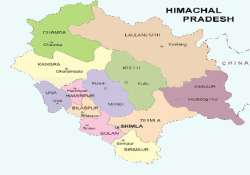2011 Himachal census: Sex ratio up, decadal growth down
Shimla: The decadal population growth in Himachal Pradesh declined from 17.53 per cent in 2001 to 12.94 per cent in 2011 while the sex ratio improved marginally from 970 to 972, as per final data

Shimla: The decadal population growth in Himachal Pradesh declined from 17.53 per cent in 2001 to 12.94 per cent in 2011 while the sex ratio improved marginally from 970 to 972, as per final data of census.
The state also saw improvement on literacy front as it soared from 76.48 per cent to 82.8 per cent.
The literacy rate was 81.9 per cent in rural areas and 91.1 per cent in urban areas while the male and female literacy was 89 per cent and 75.9 per cent respectively.
Hamirpur district has highest literacy rate of 88.2 per cent while Chamba district was at the bottom with 72.2 per cent literacy rate.
Among the 21,690 villages of the state, 2,808 were non-habitated, while 42 villages had only one household and Kharal village in Kullu district has highest population of 12,324.
The total population has increased from 60.68 lakh to 68.64 lakh which included 34,81,871 male and 32,82,729 female and the increase of population was 12.7 per cent in rural areas and 15.3 per cent in urban areas.
The biggest Kangra district has highest population of 15,10,751 while Lahaul and Spiti district has lowest population of 31,564.
The population growth was 16.3 per cent in Una district and just 5 per cent in tribal Lahaul and Spiti district.
The gender ratio was 972 but it was 986 in rural areas and 853 in urban areas.
Hamirpur district has highest sex ratio of 1,095 while tribal Lahaul and Spiti district has highest child sex ratio (0-6 years) of 1033. The adjoining tribal district of Kinnaur has lowest sex ratio of 819.
The child population stood at 7,77,898 which included 4,07,459 males and 3,70,439 female and child sex ratio was at 909.
Una has lowest child sex ratio of 875 and it was 912 in villages and 881 in urban areas.
Kangra has highest child population of 1,64,660 while Lahaul and Spiti has only 3125 children in 0-6 age group.
The actual number of male and female literates is 27,52,590 and 22,87,146. Hamirpur district has highest literacy rate of 88.2 per cent while Chamba district stood at the bottom with only 72.2 per cent literates.
The state also saw improvement on literacy front as it soared from 76.48 per cent to 82.8 per cent.
The literacy rate was 81.9 per cent in rural areas and 91.1 per cent in urban areas while the male and female literacy was 89 per cent and 75.9 per cent respectively.
Hamirpur district has highest literacy rate of 88.2 per cent while Chamba district was at the bottom with 72.2 per cent literacy rate.
Among the 21,690 villages of the state, 2,808 were non-habitated, while 42 villages had only one household and Kharal village in Kullu district has highest population of 12,324.
The total population has increased from 60.68 lakh to 68.64 lakh which included 34,81,871 male and 32,82,729 female and the increase of population was 12.7 per cent in rural areas and 15.3 per cent in urban areas.
The biggest Kangra district has highest population of 15,10,751 while Lahaul and Spiti district has lowest population of 31,564.
The population growth was 16.3 per cent in Una district and just 5 per cent in tribal Lahaul and Spiti district.
The gender ratio was 972 but it was 986 in rural areas and 853 in urban areas.
Hamirpur district has highest sex ratio of 1,095 while tribal Lahaul and Spiti district has highest child sex ratio (0-6 years) of 1033. The adjoining tribal district of Kinnaur has lowest sex ratio of 819.
The child population stood at 7,77,898 which included 4,07,459 males and 3,70,439 female and child sex ratio was at 909.
Una has lowest child sex ratio of 875 and it was 912 in villages and 881 in urban areas.
Kangra has highest child population of 1,64,660 while Lahaul and Spiti has only 3125 children in 0-6 age group.
The actual number of male and female literates is 27,52,590 and 22,87,146. Hamirpur district has highest literacy rate of 88.2 per cent while Chamba district stood at the bottom with only 72.2 per cent literates.